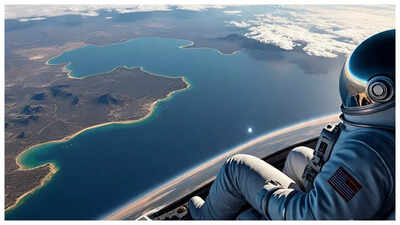Indian-origin astronauts who took to space: Where did they study from

Across decades and continents, Indian-origin astronauts have become symbols of human ambition, piloting spacecraft, walking in zero gravity, and pushing the frontiers of science beyond Earth’s cradle. Their presence aboard international missions reflects not just individual brilliance, but the quiet power of perseverance, identity, and global education.But long before space capsules and mission briefings, there were chalkboards, lab benches, and sleepless nights over textbooks. Their cosmic journeys did not begin at the launchpad, they began in classrooms. From Indian engineering colleges to American military academies and international universities, these are the institutions that prepared them to defy gravity and redefine possibility.
Raja Chari – Calibrated for command
Raja Chari’s path to space was charted not by chance, but by calculated discipline and intellectual precision. Long before he ever commanded a spacecraft, he was being shaped by institutions that demanded excellence in thought, character, and control.At the United States Air Force Academy, Chari pursued a Bachelor’s in Astronautical Engineering, a decision that paired the rigidity of physics with the unpredictability of flight. It was here that he first balanced equations and expectations, military codes and celestial mechanics.Then came MIT, where as a Draper Fellow, he immersed himself in the intricate language of propulsion and orbital dynamics. His Master’s degree in Aeronautics and Astronautics wasn’t just academic—it deepened his fluency in flight systems that would later define life-and-death moments in the cockpit.At the US Naval Test Pilot School, he evolved from engineer to aviator, from theory to practice. Flying at the edge of the envelope, Chari learned not only to operate aircraft but to trust judgment over instinct—essential training for navigating the black silence of space.His education didn’t simply prepare him to fly; it embedded in him a quiet mastery, a capacity to lead when velocity meets vulnerability.
Sunita Williams – The Engineer of endurance
Sunita Williams’ steady grace in orbit is no accident. It was earned, shaped by years of education that demanded both discipline and resilience, and forged in classrooms where curiosity was never separate from service.At the United States Naval Academy, Williams pursued a degree in Physical Science. Her days were filled with calculations and cadet drills, a life that trained both mind and muscle. It was here she began to internalize the mechanics of motion and the magnitude of responsibility.Later, at the Florida Institute of Technology, she earned her Master’s in Engineering Management. The programme gave her not just technical perspective, but systems-level clarity—equipping her to think like a mission commander before she ever became one.Her academic path did more than build knowledge; it nurtured composure. Whether commanding the ISS or walking in space, Williams drew on that same foundation—quiet, precise, enduring.
Sirisha Bandla – Engineering the Future of Flight
Sirisha Bandla’s journey is woven from equal parts calculation and courage. As a child of aerospace dreams, she pursued education not just to understand flight, but to shape its future.At Purdue University, she earned a Bachelor’s in Aeronautical Engineering at the very institution that launched Neil Armstrong’s lunar legacy. There, she absorbed the fundamentals of aerodynamics and propulsion, grounding her aspirations in structure and logic.But her orbit would take her beyond engineering. At George Washington University, she earned an MBA, mastering the business and policy frameworks that now steer the private space industry. It was a transition from circuits to strategy, from the lab bench to the boardroom.Her academic journey wasn’t linear—it was layered. And that dual fluency in science and systems is what placed her at the helm of commercial space exploration.
Shubhanshu Shukla – ISRO’s Flagbearer in Orbit
Shubhanshu Shukla’s ascent to the stars began in the heart of India, shaped by classrooms that nurtured both intellect and intent. His story is one of quiet determination, charted through the nation’s most disciplined academic institutions.He began at City Montessori School in Lucknow, where global citizenship was more than a motto, it was a way of thinking. There, Shukla’s early promise was matched by a rigorous education rooted in moral clarity and academic rigour.At the National Defence Academy in Pune, he pursued a Bachelor’s in Computer Science, training alongside India’s future military leaders. It was here that intellect met endurance, and where his vision for space was sharpened by discipline.Graduating from the Indian Air Force Academy, Shukla took to the skies as a fighter pilot, honing skills in precision, composure, and high-altitude decision-making. Those same instincts would carry him into orbit as ISRO’s first astronaut aboard the International Space Station in 2025.His education wasn’t just preparation, it was propulsion.
Kalpana Chawla – Scholar of the Skies
Kalpana Chawla’s legacy began in the unlikeliest of places: a modest town in Haryana, where she dreamed of flying while most were grounded by expectation. Her academic path became her rebellion, and ultimately, her immortality.At Punjab Engineering College in Chandigarh, she became one of the first women to graduate in Aeronautical Engineering. In a field dominated by men, Chawla’s quiet resolve spoke volumes. Each calculation, each sleepless night at the drafting table, was a step toward the stars.She took her dreams westward to the University of Texas at Arlington, where her Master’s in Aerospace Engineering layered her ambition with depth. Her questions became more complex, her confidence sharper.At the University of Colorado Boulder, she earned her PhD, cementing her status not just as a student of the sky, but as a contributor to the science that would one day carry her into it.Her degrees weren’t just academic achievements, they were launch codes, unlocking the boundless.





